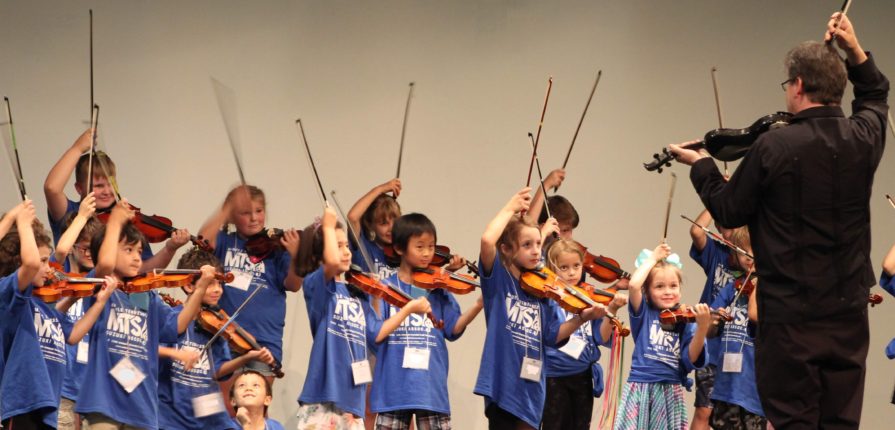By Anca Simon
“This is our first time at the workshop, and it was wonderful!” exclaimed Michelle Zhu as students were carefully descending from the stage, violin cases snapped closed, and the enthusiastic chatter about another wonderful recital was increasing around us. Others who have attended the annual MTSA Fall Workshop for many years, like the Gadd family who were there for the 4th year in a row, also agreed that this was a great weekend for Suzuki students and parents. “Another successful MTSA workshop in the books! We look forward to it every year. We love seeing the community of Suzuki families that help us realize what an amazing thing we are a part of,” commented Robyn Gadd.
The 12th annual MTSA Fall Workshop took place during the last weekend of September at St. Cecilia Academy. The workshop brought together 78 students, their families, and numerous instructors from the Middle Tennessee area. The workshop had a great lineup of individual masterclasses with guest clinicians as well as group classes, an eye-opening parent talk, a fantastic recital, and valuable teacher training. Guest clinicians included Terry Durbin (University of Louisville), Crystal Plohman Wiegman (Vanderbilt University’s Blair School of Music), Sarah Smale (White Mountain Suzuki Institute, NH), and Edmund Sprunger (St. Louis Psychoanalytic Institute).
Were you to ask various workshop participants what their favorite part was, you would learn about the hard work and intense interest the instructors showed their students in class. Parker Gadd’s favorite part was the fiddle class, Avery Gadd’s favorite class was with instructor Sarah Smale, while Lily Gadd said she truly liked all her classes (although she had to admit lunch time outside enjoying a beautiful September day and playing with friends was her favorite part).
You would most definitely also hear about the insightful comments shared by Edmund Sprunger during the parent talk on Saturday. Sprunger studied with Dr. Shin’ichi Suzuki and has taught violin for more than 20 years. He is also trained as a psychotherapist and author of Helping Parents Practice: Ideas for Making It Easier (Vol. 1) and Building Violin Skills: A Set of Plans Designed to Help Parents and Children Construct Positive Practices. Who better to help us understand how we can most effectively assist our students and children in practice and in life?!
What was the most enlightening part of the parent talk, you may wonder? Maybe it was the emphasis Sprunger placed on the fact that our goal as parents is “not to take it personally” when our children mess up. Or maybe it was the reminder that we should be careful not to jump in when our children are working to figure something out, not to quickly tell them what that note is or how to change the bowing or fingering, to let them figure it out on their own – yet “without abandoning them,” without walking away, while continuing to be present, acknowledging their effort, and helping only if they request it. Or maybe it was the renewed motivation he seemed to inspire by encouraging us to set clear expectations during practice. “Kids can handle frustrations as long as the beginning is clear and the end is clear,” Sprunger stated. Games can help define that beginning and end. Using games also makes us, the parents, break assigned work down into smaller, more doable pieces, which benefits all. Or lastly, maybe it was the well-known and yet easily broken rule that we should give choices whenever we can, but that we absolutely should not make something a choice if it isn’t truly one.
Inevitably, you would also talk to someone like Lydia Xing whose favorite part was the recital. The MTSA Fall Workshop closing recital took us on an international journey from Argentina with Piazzola’s Libertango to Kentucky with Bill Monroe’s Jerusalem Ridge, New York with Buffalo Gals, and of course Japan and Europe via the traditional Suzuki repertoire. Stephanie Taylor summed it up best when she shared that the workshop was “inspiring and fun” and that her personal take aways were that “(1) we are playing violin because it is fun; if it is not fun, we’re not doing it right! (2) being a kid is hard; [we need to] listen and be aware of their frustrations so that practice can be more successful; (3) fiddling is fun!”

